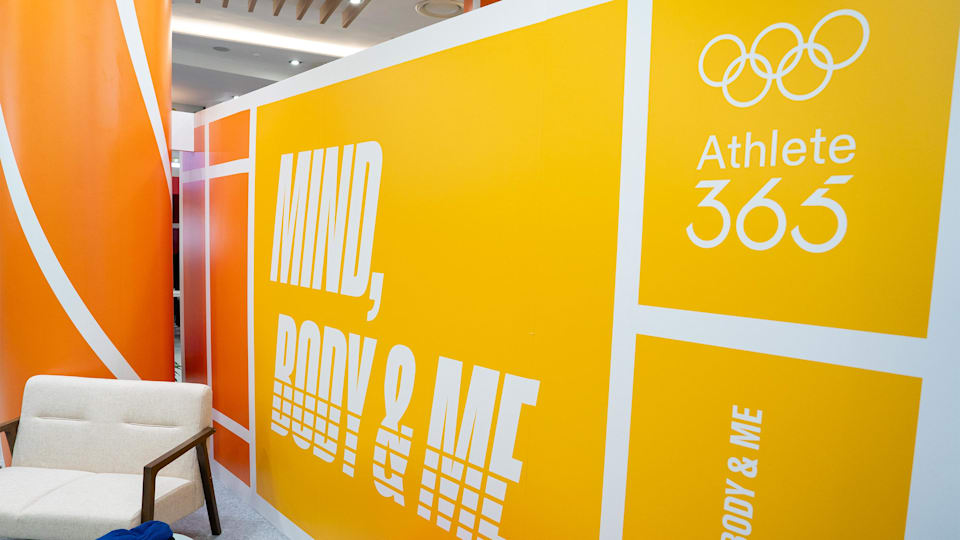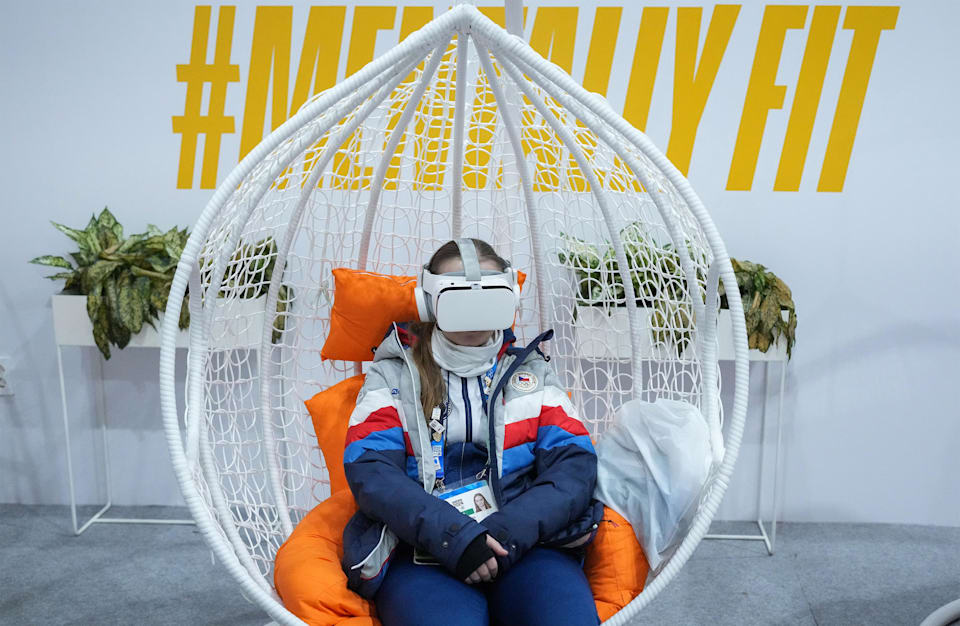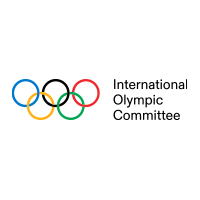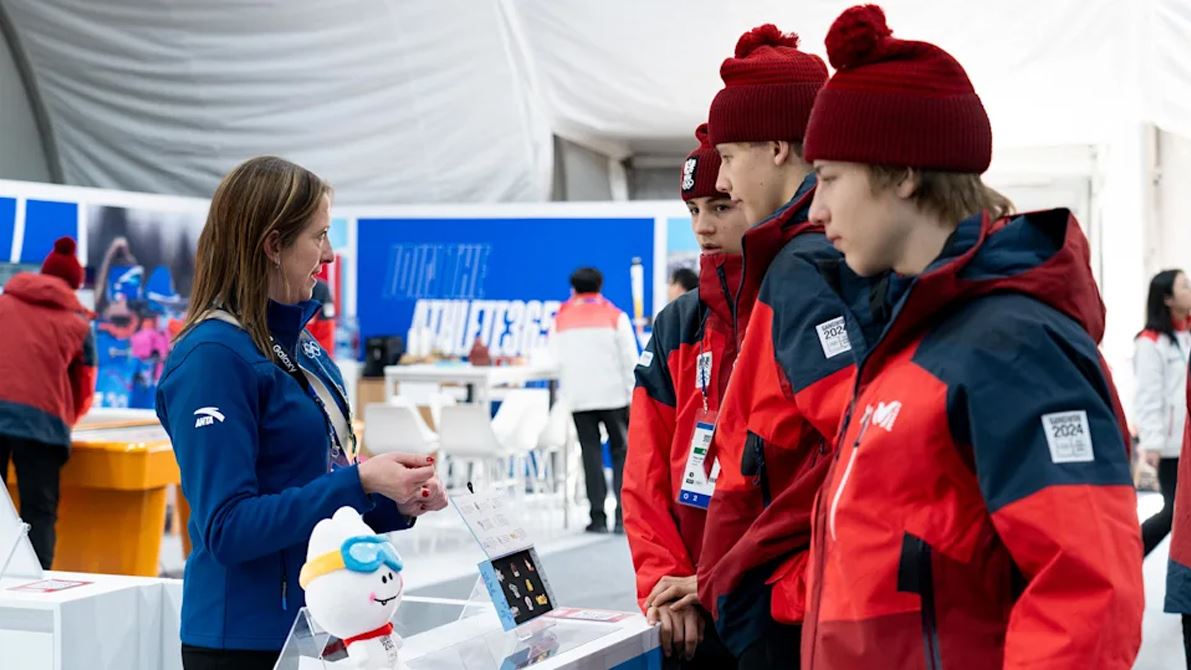26 January 2024 - Young athletes competing at the Winter Youth Olympic Games (YOG) Gangwon 2024 are being reminded that mental health is just as important as physical health and that they have access to a number of tools to help them protect their well-being.
For Gangwon 2024, the International Olympic Committee (IOC) has designed an educational booth integrating mental and physical health and safeguarding education called “Mind, Body and Me”, with the aim of normalising mental health conversations, recognising and responding to behaviours that have no place in sport, and teaching athletes exercises to help prevent injury.
“Mental health is a very big topic for athletes,” said Lina Riedl (AUT), a bronze medallist in the women’s luge at Gangwon 2024. “You don’t always recognise it from the outside, but it’s important. If you have good mental health, then you’re much better in the sport, because you can focus on your sport without other things distracting you.”
You don’t always recognise it from the outside, but it’s important. If you have good mental health, then you’re much better in the sport, because you can focus on your sport without other things distracting youLina Riedl (AUT) - Bronze medallist in the women’s luge at Gangwon 2024
A benefit to performance
Based in Athlete365 House, the “Mind, Body and Me” booth is part of the wider Athlete Education Programme being rolled out at the Youth Olympic Villages. Athlete Role Models with direct experience of mental health issues are often on-site at the booth to speak with the athletes. Positive, accessible language under the tagline “Mentally Fit” is helping to make the topic approachable, while demonstrating to athletes that investment in their mental health is beneficial to both their performance and overall well-being.
The booth includes a virtual reality (VR) mindfulness experience, where athletes can spend time in a peaceful, immersive environment in one of three specially designed “disconnection pods”. The athletes are then encouraged to become part of Athlete365 – the IOC’s official community of more than 140,000 athletes – through which they will receive a free subscription to a mindfulness app to support them as they continue their sporting journey.

Athletes open to mental health conversations
The mental health conversation in sport has shifted in recent years. High-profile instances of big-name athletes such as Simone Biles and Mikaela Shiffrin speaking out about how athletes grapple with anxiety, depression, performance pressure and personal struggles, just like anyone else, have empowered others. This young generation of athletes are generally more open than previous generations to talking about their feelings, reflecting a growing understanding that athletes' psychological well-being is intertwined with their overall success and resilience. This was clear in the Youth Olympic Villages as they engaged enthusiastically with the activities on offer.
“The ‘Mind, Body and Me’ booth was my favourite one,” said Australian biathlete Matthew Wilby. “I liked the meditation with the VR goggles; it was relaxing”.
Mental health is very important, especially when trying to juggle life in general with training and competitions.Matthew Wilby - Australian biathlete
Canadian short-track speed skating coach Elizabeth Ward believes that attitudes are changing and that it’s important to engage with the athletes at this young age.
“For the athletes, it’s really cool for them to actually experience it first-hand,” she said. “If they get to do these activities and the whole ‘Mind, Body and Me’ section, they will be more engaged in the process of talking about mental health. I’ve seen a shift with athletes talking about it, where it’s OK to say, ‘I’m not feeling mentally OK today’. When I was an athlete 10 years ago, that was not a conversation we could have.
“I think it’s important for the youth to get this training, so that we’re not introducing something totally new when they’re in their 20s and ingrained in a process. It should be part of their development, so that when they get to that next level – the Olympic Games – it’s normal.”

IOC leading the way
Ahead of Gangwon 2024, the IOC helped the athletes prepare for the YOG with a learning module called “Staying Mentally Fit”. Part of the Gangwon 2024 Readiness Programme, the course was aimed at raising awareness of the impact that one’s mental state can have on sporting performance as well as empowering athletes with strategies to help them cope with their mental health symptoms.
The IOC has made great strides in addressing mental health issues in recent years, supported by the Mental Health Working Group, leading to the publication in 2023 of the IOC Mental Health Action Plan, which serves as a roadmap for the organisation’s work in the area.
Olympic champion in shooting and IOC Athletes’ Commission member Abhinav Bindra is the athlete representative on the IOC Mental Health Working Group. Bindra has spoken openly about his own mental health challenges and was happy to see the work bearing fruit for the athletes in Gangwon.
Loved the energy and athlete engagement at the @Athlete365 House at #Gangwon2024 today. As part of the IOC Athlete Commission, seeing our initiatives in action is deeply gratifying. The gamified learning and VR meditation zone are just what we envisioned for enhancing athlete… pic.twitter.com/dI2XhwcOaZ
— Abhinav A. Bindra OLY (@Abhinav_Bindra) January 20, 2024
“As part of the IOC Athletes’ Commission, seeing our initiatives in action is deeply gratifying,” he said. “The gamified learning and VR meditation zone are just what we envisioned for enhancing athlete support. I’m proud of our collective effort in bringing mental fitness, safe sport and Olympic solidarity to the forefront. These are the steps that truly uplift athlete well-being and development.”
For more information, visit the #MentallyFit section on Athlete365

